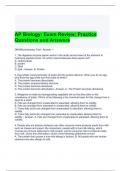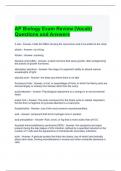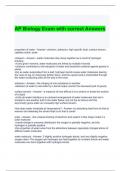Ap biology - Study guides, Class notes & Summaries
Looking for the best study guides, study notes and summaries about Ap biology? On this page you'll find 2781 study documents about Ap biology.
Page 4 out of 2.781 results
Sort by
AP Biology Exam Review Practice Questions and Answers
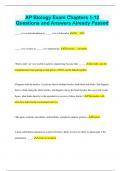
-
AP Biology Exam Chapters 1-12 Questions and Answers Already Passed
- Exam (elaborations) • 111 pages • 2024
- Available in package deal
-
- $12.49
- + learn more
AP Biology Exam Chapters 1-12 Questions and Answers Already Passed _____ is to a mitochondrion as _____ is to a chloroplast O2 ... CO2 _____ is to science as _____ is to engineering. Discovery ... invention "Sticky ends" are very useful in genetic engineering because they _____. provide a site for complementary base pairing so that pieces of DNA can be linked together (Diagram with the beetles. 1st picture shows multiple beetles both black and white. 2nd diagram shows a bird eat...
AP Biology Exam Review (Vocab) Questions and Answers
AP Biology Exam with 100% correct Answers
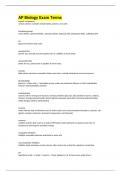
-
AP Biology Exam Terms
- Exam (elaborations) • 23 pages • 2024
- Available in package deal
-
- $10.49
- + learn more
AP Biology Exam Terms organic compounds contain carbon; examples include lipids, proteins, and carbs functional groups amino (NH2), carbonyl (RCOR), carboxyl (COOH), hydroxyl (OH), phosphate (PO4), sulfhydryl (SH) fat glycerol and three fatty acids saturated fats bad for you; animals and some plants have it; solidifies at room temp. unsaturated fats better for you, plants have it; liquifies at room temp. steriods lipids whose structures resemble chicken-wire fence...
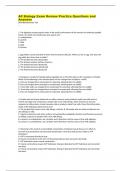
-
AP Biology Exam Review Practice Questions and Answers
- Exam (elaborations) • 42 pages • 2024
-
- $15.39
- + learn more
AP Biology Exam Review Practice Questions and Answers DNA/Biochemestry Test -- 1. The digestive enzyme pepsin works in the acidic environment of the stomach to hydrolyze peptide bonds. On which macromolecules does pepsin act? A. carbohydrate B. protein C. DNA D. lipid B. Protein 2. Egg whites consist primarily of water and the protein albumin. When you fry an egg, why does the egg white turn from clear to white? A. The protein becomes dissociated. B. The protein acquires terti...
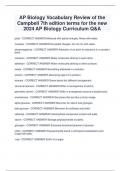
-
AP Biology Vocabulary Review of the Campbell 7th edition terms for the new 2024 AP Biology Curriculum Q&A
- Exam (elaborations) • 65 pages • 2024
-
- $18.49
- + learn more
AP Biology Vocabulary Review of the Campbell 7th edition terms for the new 2024 AP Biology Curriculum Q&A polar - CORRECT ANSWER-Molecule with partial charges. Mixes with water. nonpolar - CORRECT ANSWER-No partial charges. Do not mix with water. electronegativity - CORRECT ANSWER-Attraction of an atom for electrons in a covalent bond. cohesion - CORRECT ANSWER-Water molecules sticking to each other. adhesion - CORRECT ANSWER-Water molecules sticking to other surfaces. solute - CORRE...
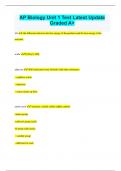
-
AP Biology Unit 1 Test Latest Update Graded A+
- Exam (elaborations) • 23 pages • 2024
- Available in package deal
-
- $9.99
- + learn more
AP Biology Unit 1 Test Latest Update Graded A+ ∆G -the difference between the free energy of the products and the free energy of the reactants acidic If [H+]>[-OH] adhesion -H2O molecules form H bonds with other substances ~capillary action ~meniscus ~water climbs up fiber amino acids -structure: central carbon (alpha carbon) -amino group -carboxyl group (acid) -R group (side chain) ~variable group ~different for each ~confers unique chemical properties -phys...
AP Biology Exam with correct Answers
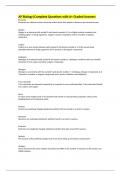
-
AP Biology|Complete Questions with A+ Graded Answers
- Exam (elaborations) • 37 pages • 2024
-
- $13.59
- + learn more
AP Biology|Complete Questions with A+ Graded Answers Elements Elements are substances that cannot be broken down into simpler substances by chemical means. Oxygen Oxygen is an element with symbol O and atomic number 8. It is a highly reactive nonmetal and oxidizing agent. In living organisms, oxygen is used in respiration and in a number of organic molecules. Carbon Carbon is an non mental element with symbol O and atomic number 6. It is the second most abundant element in living o...

Did you know that on average a seller on Stuvia earns $82 per month selling study resources? Hmm, hint, hint. Discover all about earning on Stuvia

